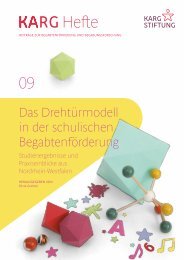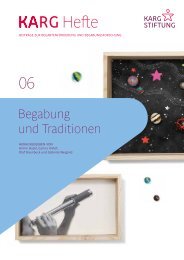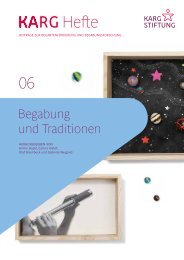FAQS: Frequently asked questions about giftedness
The Karg Foundation receives a lot of questions on the subject of giftedness—FAQs (Frequently Asked Questions)—far more often indeed than it did ten years ago. And this is a good thing! Many people involved in the educational processes of children have come to realize that giftedness can also be a fundamental personality trait of children and adolescents. The Karg Foundation wants to answer the questions you may have not only as educational and psychological professionals in educational institutions or working as educational providers, policy makers, or in training and further education institutes, but as parents and gifted people also: What is giftedness? How can it be identified? Who can provide advise for gifted children and their families? How can they be supported in the best possible way?
The Karg Foundation receives a lot of questions on the subject of giftedness—FAQs (Frequently Asked Questions)—far more often indeed than it did ten years ago. And this is a good thing! Many people involved in the educational processes of children have come to realize that giftedness can also be a fundamental personality trait of children and adolescents.
The Karg Foundation wants to answer the questions you may have not only as educational and psychological professionals in educational institutions or working as educational providers, policy makers, or in training and further education institutes, but as parents and gifted people also: What is giftedness? How can it be identified? Who can provide advise for gifted children and their families? How can they be supported in the best possible way?
You also want an ePaper? Increase the reach of your titles
YUMPU automatically turns print PDFs into web optimized ePapers that Google loves.
What are some possible<br />
challenges of being labeled<br />
“gifted”?<br />
Stereotypes <strong>about</strong> gifted people exist, and some of<br />
them are false, either portraying gifted people unfavorably<br />
or suggesting that they succeed at just <strong>about</strong> everything<br />
effortlessly. Besides, not all <strong>giftedness</strong> is the same and can<br />
differ from person to person or from area of <strong>giftedness</strong> to<br />
area of <strong>giftedness</strong>. This gives rise to a number of tasks for<br />
counseling. First, talking <strong>about</strong> what everyone involved in<br />
the counseling process associates with the term <strong>giftedness</strong><br />
is often valuable: How is <strong>giftedness</strong> understood? What does<br />
it really mean when someone is labeled as gifted—not only<br />
for the persons themselves, but also for others? Second, in<br />
each case it is important to specify exactly what a person’s<br />
<strong>giftedness</strong> consists of: What are his/her special abilities?<br />
Are these also reflected in their self-perception of their own<br />
abilities? This “translation work” contributes to avoiding<br />
possible unfavorable effects of the label “gifted” and it<br />
helps gifted people to have a better understanding of<br />
themselves.<br />
“Not all <strong>giftedness</strong> is<br />
the same and can<br />
differ from person to<br />
person.”<br />
56 Guiding 57
















